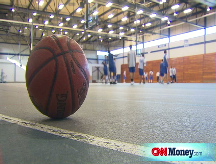Wall Street crisis snares Main St. schools
Five Wisconsin school districts claim they were misled by advisers and could lose most of $200M investment.
WHITEFISH BAY, Wis. (CNNMoney.com) -- Lehman Brothers. Washington Mutual. And now ... Whitefish Bay Schools?
The global financial crisis that claimed some of the world's biggest banks now has this suburban Milwaukee school district and four others on the brink of losing a hefty $200 million investment.
Two years ago board members from the districts signed off on an investment to fund their teachers' retirement and health care benefits.
Shawn Yde, business director for the Whitefish Bay School District, says he and his board members were told they were making a conservative investment in "AA" and "AAA"-rated bonds. Mark Hujik, from the Kenosha school board, says he and other board members were told they were investing in highly rated, and relatively safe, corporate bonds.
But instead of buying corporate bonds, the school districts actually purchased one of Wall Street's most complex financial instruments: synthetic collateralized debt obligations (CDOs).
Through the CDOs the schools were insuring the debt of more than a hundred companies, including 3M (MMM, Fortune 500), General Electric (GE, Fortune 500) and Exxon Mobil (XOM, Fortune 500). But they were also insuring debt from Lehman Brothers, Washington Mutual, Fannie Mae and Freddie Mac. With the downfall of Lehman, the failure of Washington Mutual and the government takeover of Fannie and Freddie, the debt defaults came rolling in, and the value of the schools' investment fell 95%.
The districts are now suing their investment advisor, Stifel Nicolaus, and the Royal Bank of Canada - which created the investment product - calling it fraudulent and alleging they were misled from the beginning.
The school boards' complaint says the nature and risks of the investments were intentionally or negligently misrepresented, or omitted by the RBC and Stifel Nicolaus. RBC and Stifel Nicolaus denied any wrongdoing and claim the risk was clearly outlined. And it was - on paper.
Board members from all five districts - West Allis, Kimberly, Waukesha, Whitefish Bay and Kenosha - signed closing documents that outlined investment risks. But according to Whitefish Bay's Yde, "the risk that was verbally provided to us is not the risks that we have in this transaction."
The school districts cite multiple meetings they had with David Noack, their then-financial adviser from Stifel Nicolaus. According to an audio tape of a 2006 Whitefish Bay School Board meeting, Noack told board members, "It takes 15 defaults for us to start losing money and we have someone watching over every company every day for seven years. If it looks like it's going that way, they get out of it ...You would need 15 Enrons. You would need something to happen overnight."
A videotape of another local school board meeting in May 2007 shows Noack saying, "If we stick to all investment-grade companies, you've still gotta have 10% go under, and I would assume - I'm not an economist, but that's a depression."
Noack has not been named as a defendant in the lawsuit and his lawyer declined to comment for this story.
The attorneys for the districts are calling for a rescission of the deal. A trial date is yet to be set.
As for the schools' investment, they won't know its value until it matures in 2013. But with every default, the districts come closer to seeing their $200 million investment evaporate. It's something that keeps Yde and Hujik up at night - and brings Wall Street much closer to home than ever before. ![]()



